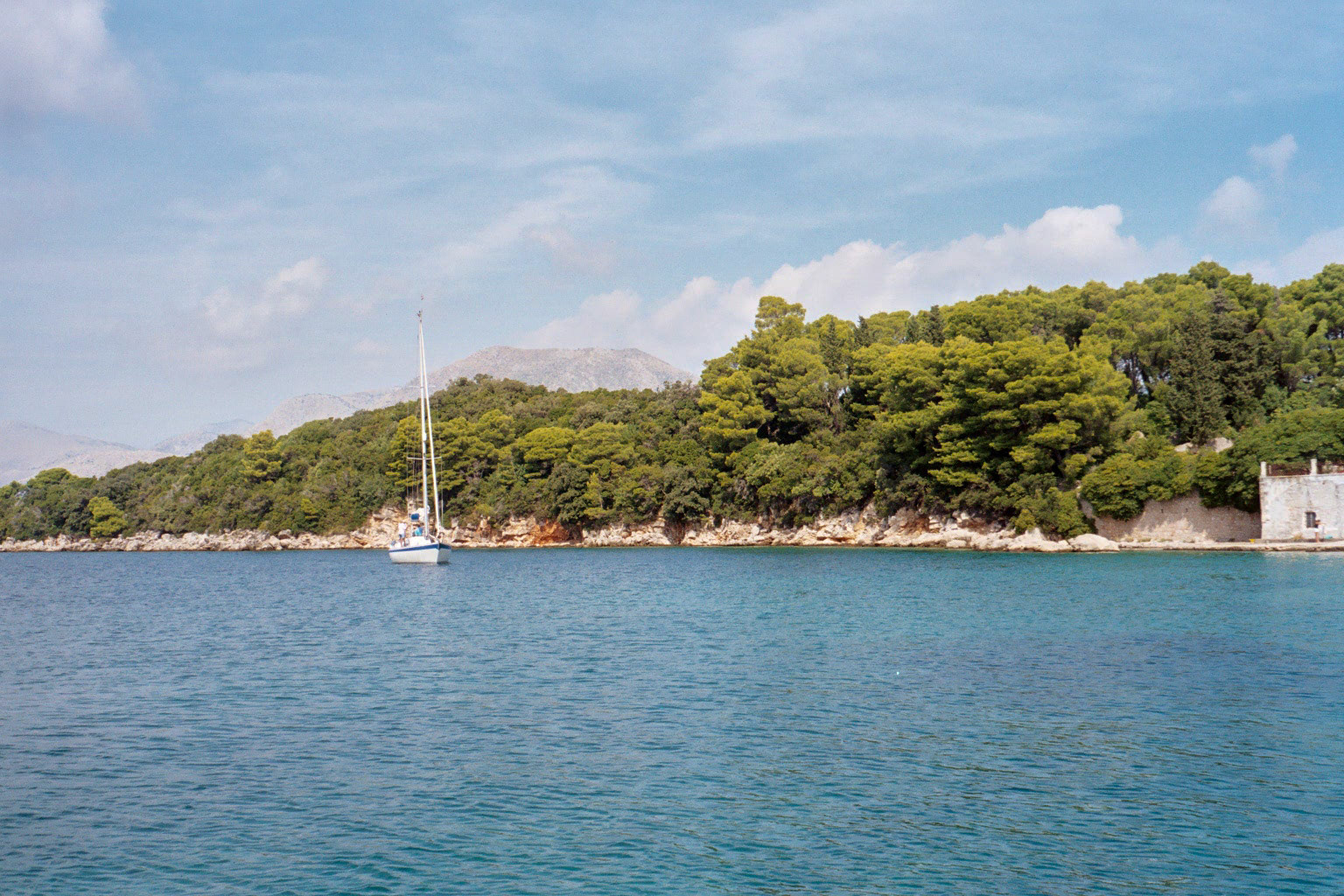
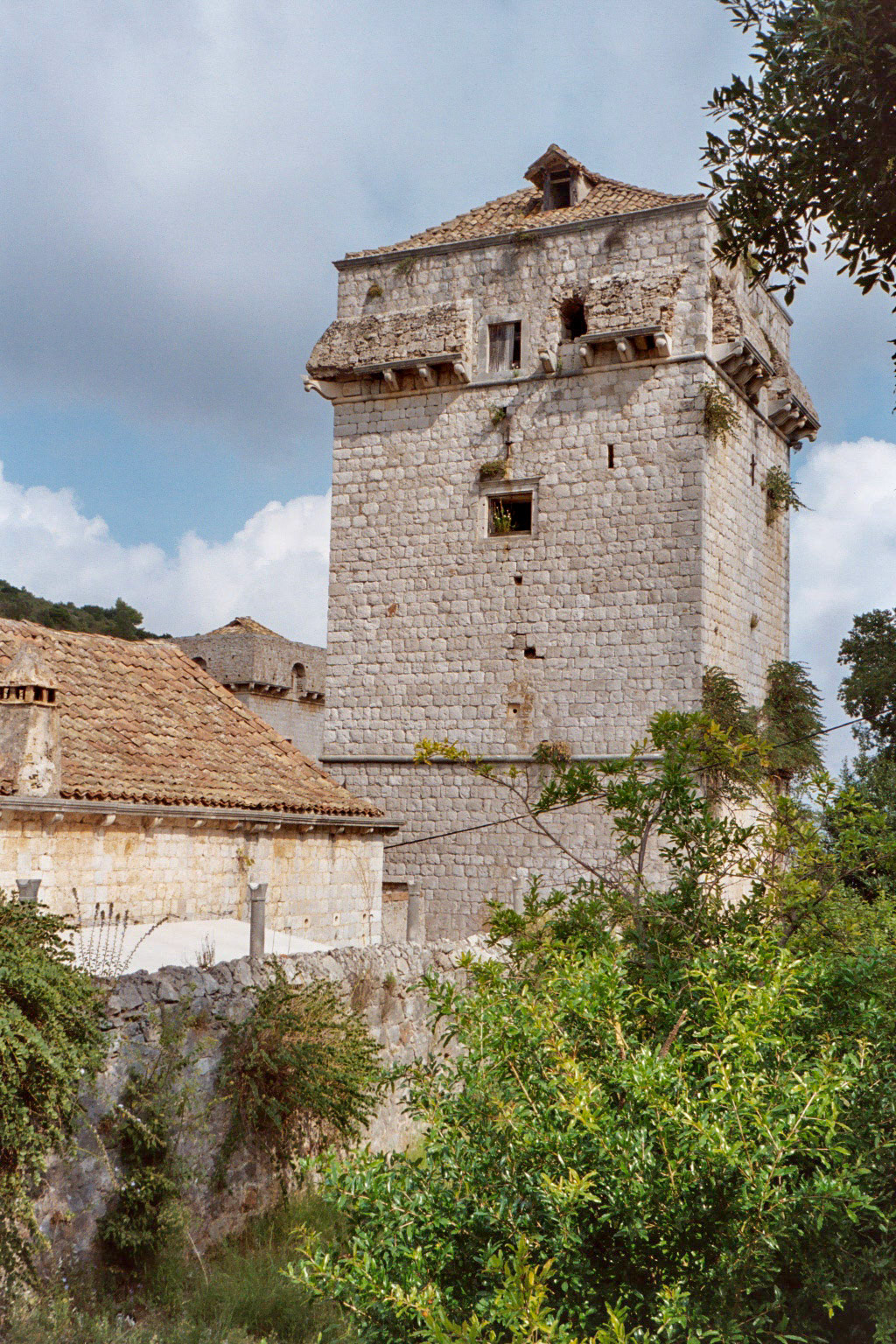
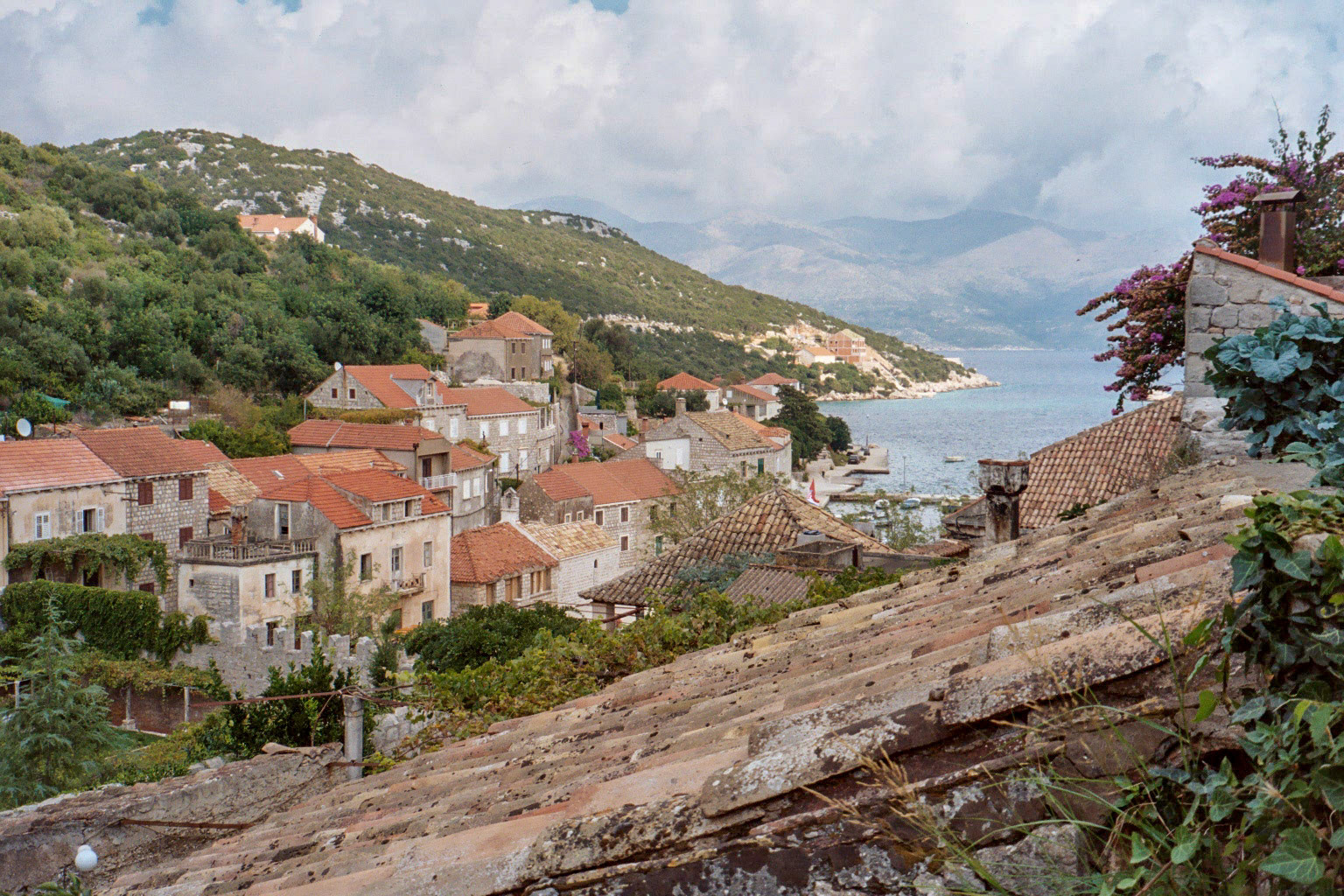
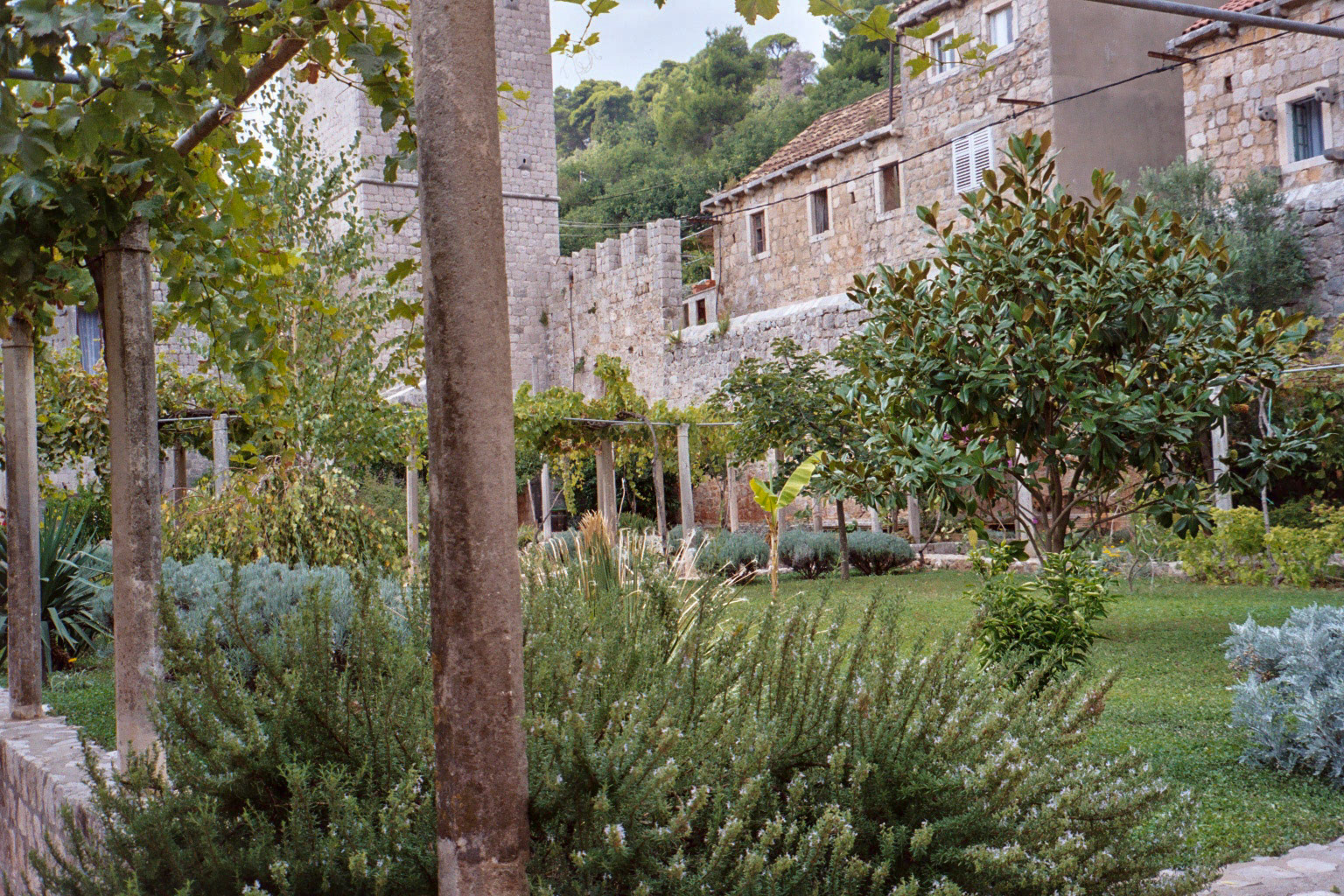
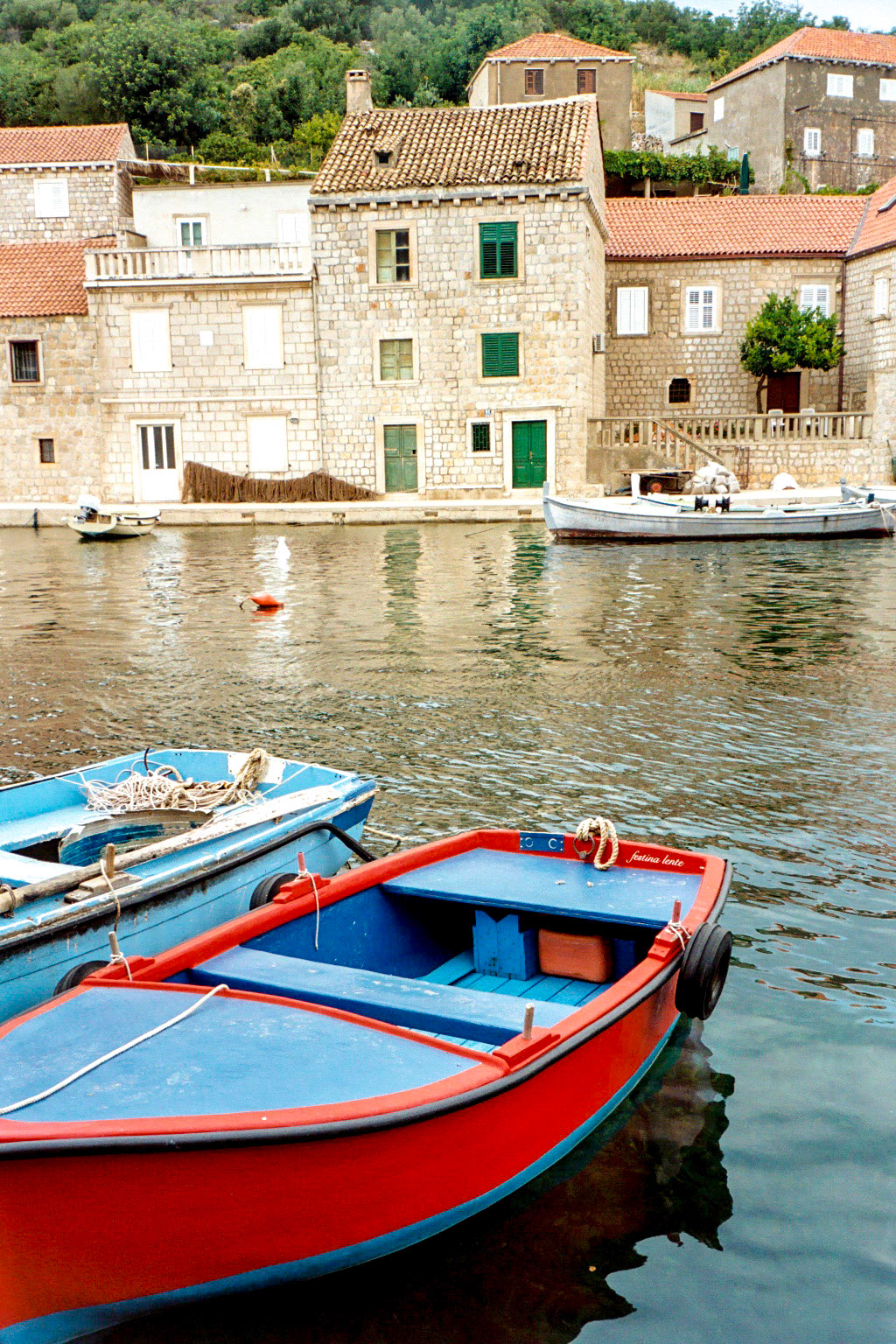
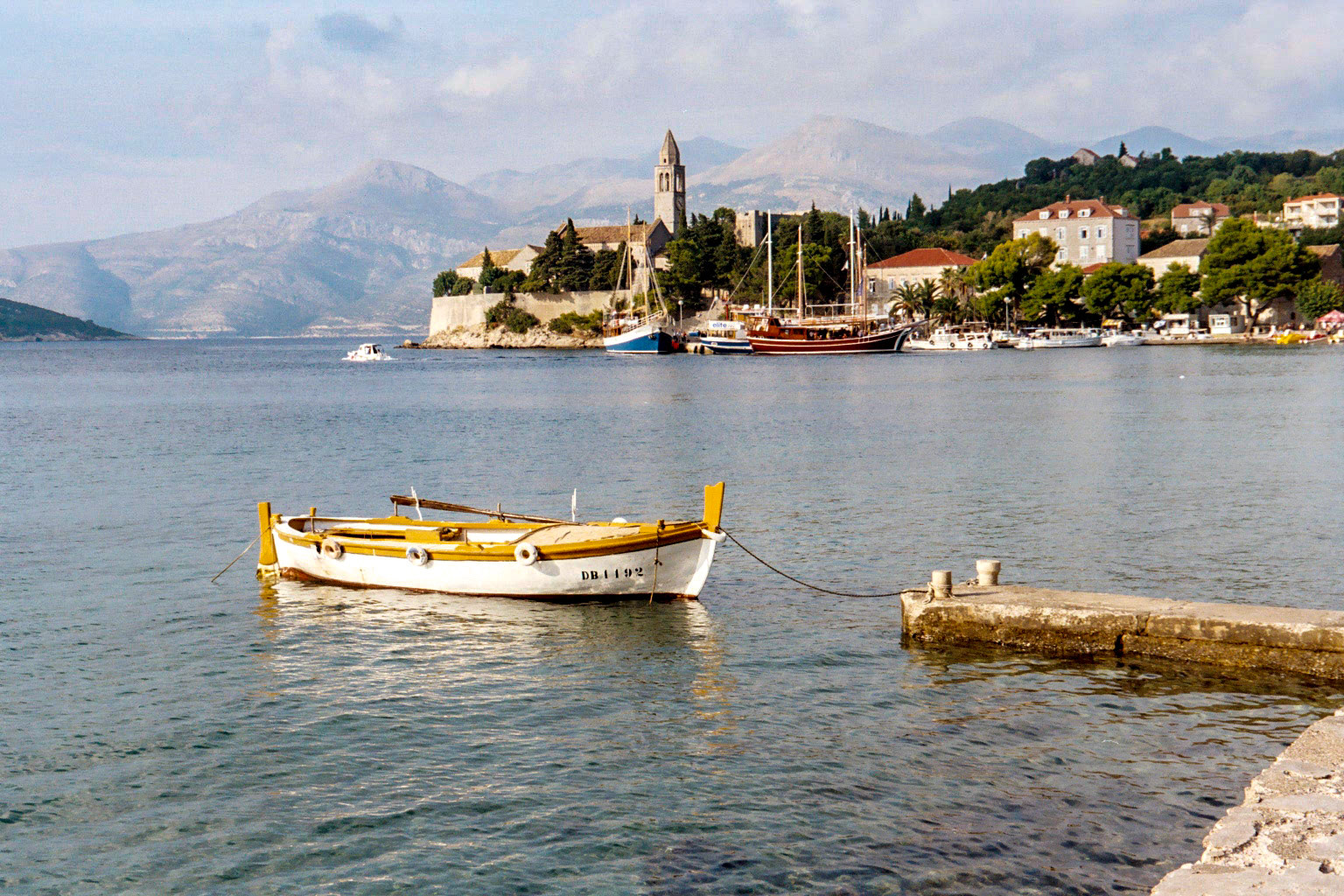
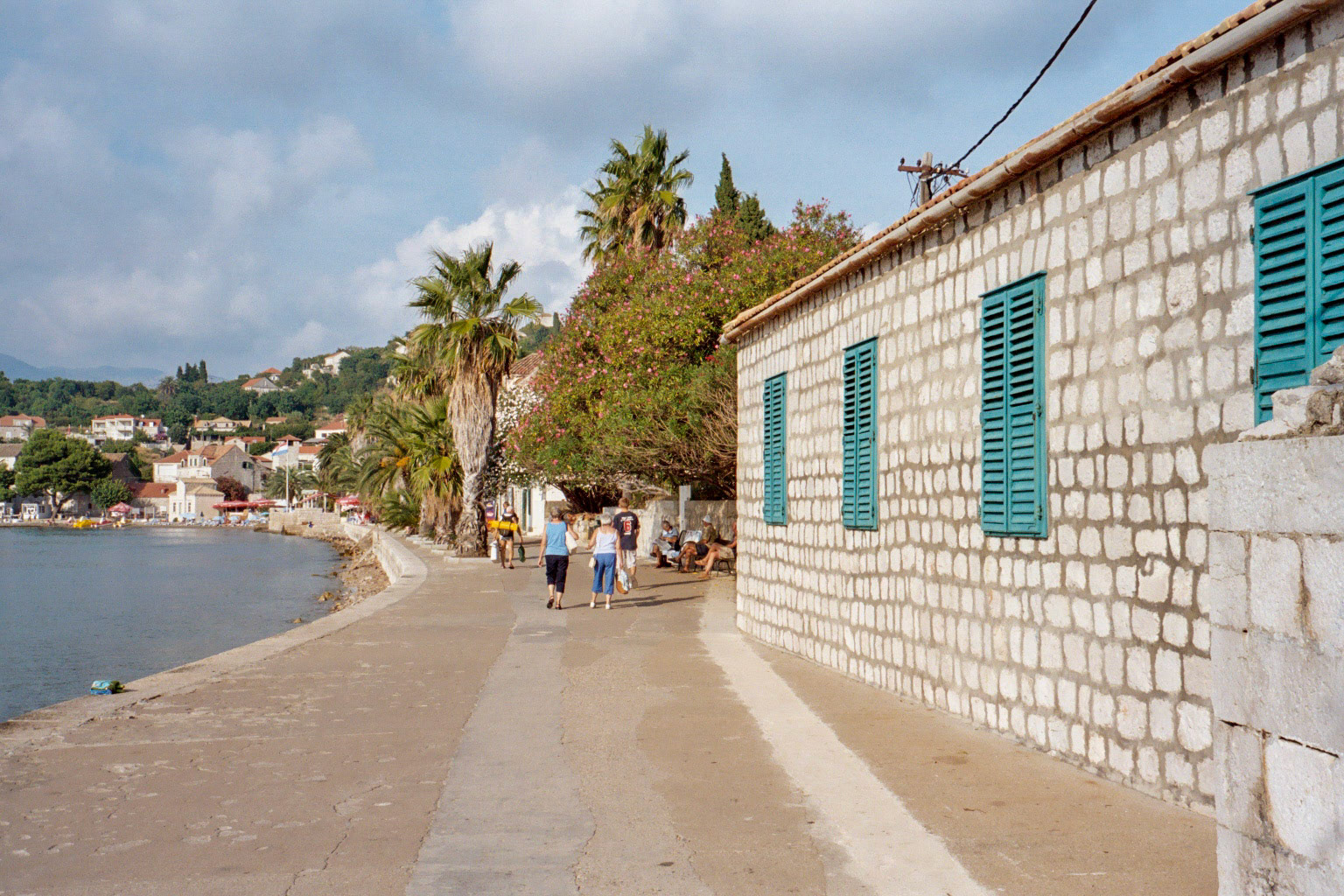
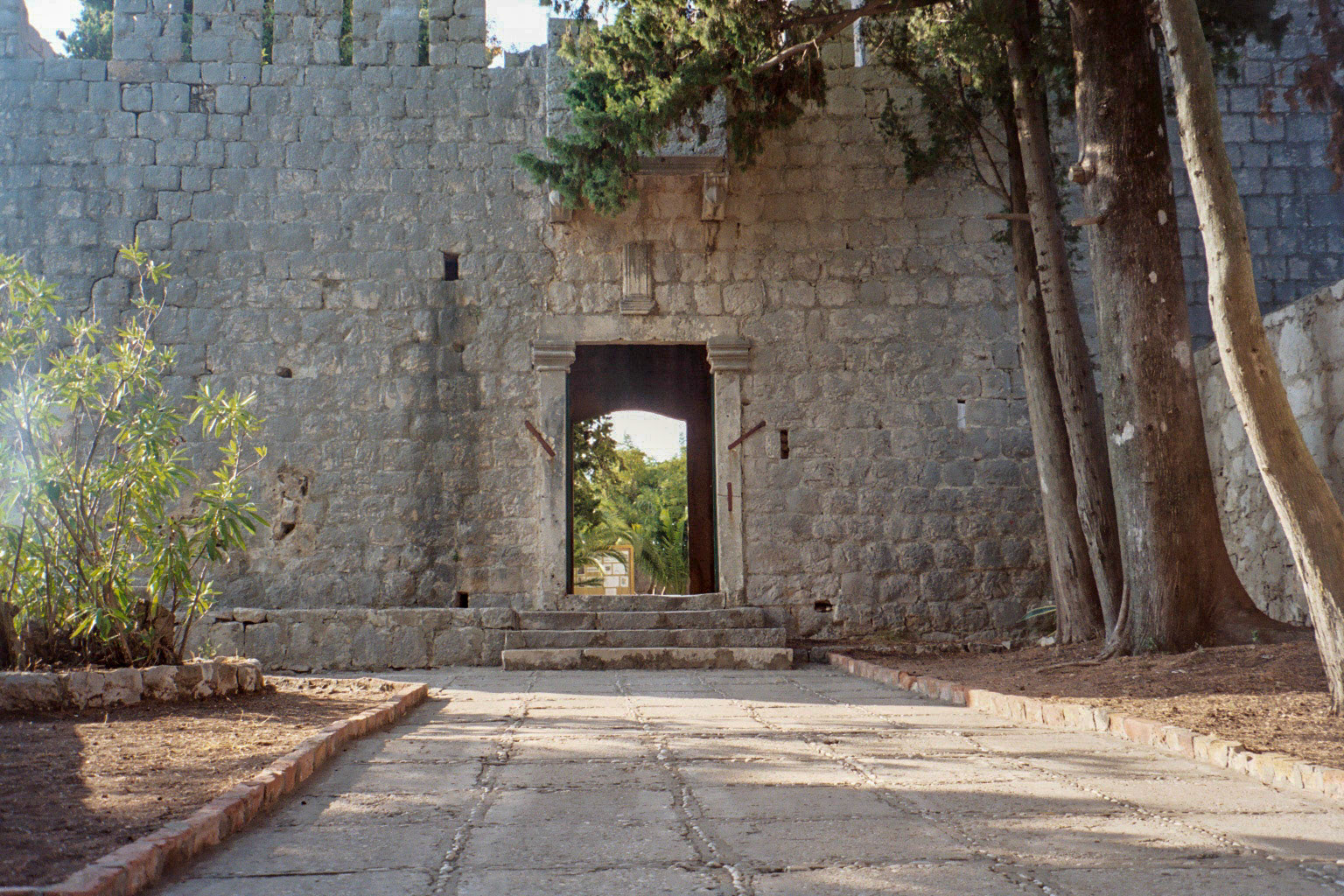
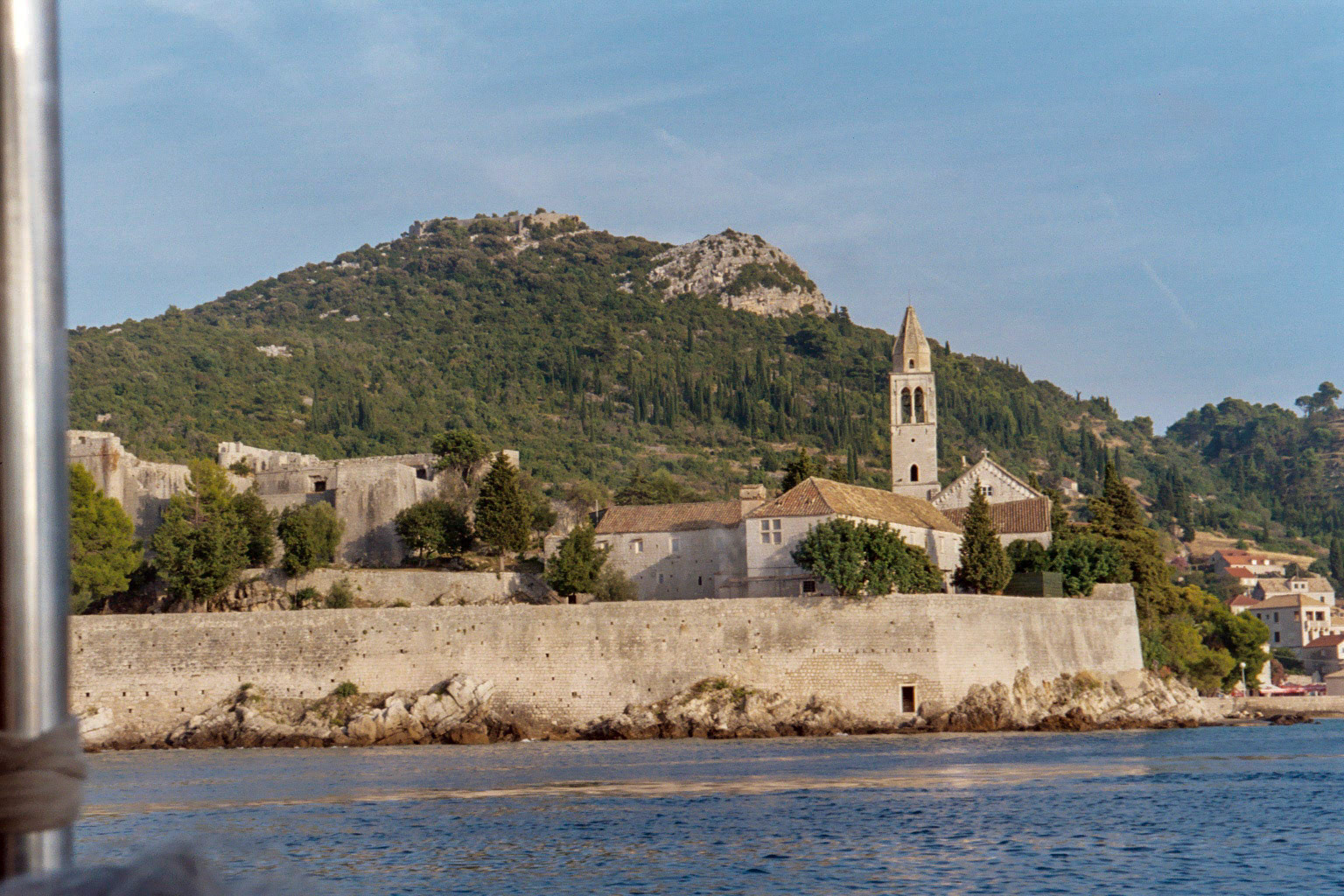
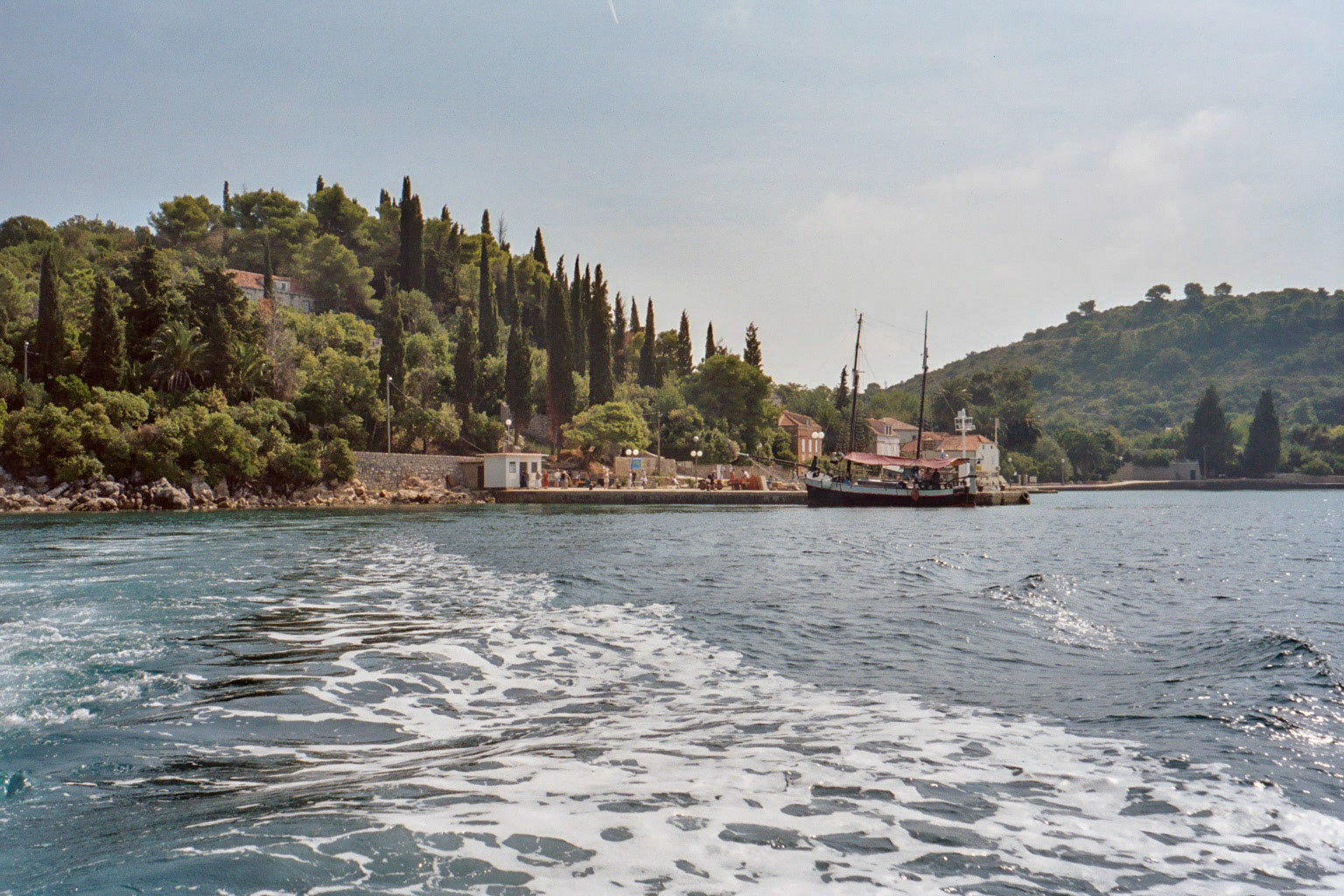
We had 18 days, making this the longest vacation I'd ever taken, even without the work-related parts.
This was an accidental trip.
Linny and I had been trying to decide were to spend two weeks in September between the end of Portland State's summer session and the beginning of fall term. Italy was high on the list because of her sister Sue's great visits. In fact, Sue and her husband Jim were planning another trip to possibly buy a place to move to. Our plans shifted when I negotiated a book publishing agreement with the Ministry of Culture of the Republic of Croatia for Ooligan Press.
From the beginning, it involved numerous strange coincidences. First was having Julie Busic, who was born and grew up in Portland, appear at my office door to ask if Ooligan Press might be interested—or if I knew of anyone who would be interested—in publishing three Croatian authors in English in the US. I explained her challenges and suggested a strategy. I think I told her that a press as green as Ooligan was at that time might be too big a risk, but there were ways to find the literary or cultural presses that might love three subsidized books.
She asked me if Ooligan was capable. I said that it was, but we also had no track record or reach yet. She said, "Let me talk with the Ministry and I'll stop by tomorrow." She did. They did. We did.
I mentioned to her that Linny and I were mulling over a trip to Italy, and she said we ought to consider Croatia. She said that if I came there, even on vacation, I should expect to be interviewed about the books, participate in events with the authors, do presentations at the central library in Zagreb, visit some small publishers, and maybe have a meeting with the Minister of Culture. Linny and I would get to enjoy literary Croatia behind the curtain. We decided to take the offer, and The Ministry paid our way while we were in Zagreb, but we got ourselves there, elsewhere, and back.
We began cobbling together a longer trip to follow the four days in Zagreb, that would, no matter the time in Zagreb, be on our dime but now with insiders guiding us. We decided to fly into Paris and take the TGV to Avignon, spend a couple of days there, get a train to Venezia via Geneva, stay in Venice for several days, and finally get a train to Zagreb via Ljubljana. It was a train ride back through centuries. This trip back in time began when we switched from the French trains to the Italian; then again when we rode an Italian train to Ljubljana, where we switched to a Croatian train. Wooden cars with compartments large enough for six. Windows facing outside on one side, and windows opening to the passage way on the other from where the conductor poured coffee from a samovar's long spout.
The trip home on 27 September would be from Paris, beginning with a 10.5 hour flight to Dallas, where we barely made it through customs in time for our 4 hour flight to Portland. By the time we landed, my butt was sore from sitting so long. Both flights were completely full and it was hard to walk around and stretch, especially with all the new security rules about "loitering" in the aisles. On the other hand, when we went to Europe two years before, we returned with four plane changes and it took 23 hours, so I should be happy about this one. We were both quite zoned from the jet lag. It took a few more days to get adjusted.
But let's back up.
The whole trip was wonderful. One of the best we've ever had. Of course, there are always glitches and stumbles. When we landed in Paris we were held up for an hour at customs because of a bomb threat, so we barely had time to get to the train (TGV - the high speed one that runs at 160 mph), but in 2 hours we were in Avignon, which is an incredibly beautiful city in Provence that we'd fallen in love with two years before. We only had 24 hours there, but we made the most of them. Our B&B was a delightful 400 year old house with an internal courtyard in the shadow of the Palace of the Popes, which is a monumental fortress/cathedral, and the weather was with us pretty much for the whole trip, so our first dinner was in a hidden courtyard cafe tucked against the towering back wall of the Palace surrounded by blooming vines and laden fig trees.
We screwed up the next day and read our train tickets wrong, arriving at the station an hour late, but the SCNF (French railway) folks simply switched us from the slow train we'd planned to take to the next TGV to Lyon for a few bucks. We were able to make our connection in Lyon for the Venice leg of the trip with time to spare. We'd figured that the night train with a sleeper would put us in Venice rested and ready to rock and roll, but neither of us could sleep in the jerky, stop-and-start trip over the Swiss and Italian tracks (the French tracks are silky smooth). We were toast when we arrived at 7:30 am and it was too early to check into our hotel, though they let us stow our luggage while we searched for an open cafe. We had breakfast next to a gondola dock and watched the amazing city awaken. Venice is astonishing.
With only two days there, we were surely moving too fast, but we also saw a lot, including one of the beautiful island villages out in the bay where they've made lace forever—until now, anyway; what was for sale there was imported from the Far East. They also paint their houses in bright colors. That's Burano, and it's just beyond Murano, where they specialize in glass.
By accident, we learned of a concert of Vivaldi played by Interpreti Venezia, which turned out the be the finest string ensemble either of us had ever heard. To make it even more moving, the concert was in a hall in which all walls and ceilings were painted by Jacopo Robusti, best known as Tintoretto, who was an Italian Renaissance painter of the Venetian school. Each painting in the space was framed by incredible relief carvings. First, the music made me weep, and then the art.
From Venice, we caught the train to Zagreb via Trieste, Italy, and Ljubljana, Slovenia. This was a daytime ride through gorgeous countryside and down glorious river valleys and canyons. We saw lots of impressive deer and birds, as well as quaint peasant villages and old castles.
We were met at the main Zagreb station by the three authors Ooligan would be publishing and by the translator, Julie Busic, a woman my age raised in Portland with one hell of a story to tell, herself. They walked us to our hotel, where we were guests of the Ministry of Culture. We got situated quickly and grabbed a couple of hours of sleep before the authors and Julie picked us up for our first dinner in Croatia.
It was a treat. These folks are definitely into food as much as the French and Italians—and us. We fell in love with these people by the time we'd spent three days with them: Julie and I are the ones who pulled off this deal, so we'd met before, but the authors were known to me only from their translated writing.
Dubravka Oreic-Tolic was a Professor of Literature at the University of Zagreb and is our age. She's not only a brilliant academic highly regarded throughout Europe, but a poet and activist. She had her passport pulled by Tito for 18 years before the dissolution of the old Yugoslavia. Her English isn't strong, but she can still make a point.
Gordan Nuhanovic was about 40. He was a war correspondent during the Homeland War and now writes fiction, as well, and would begin doing a weekly tv book show on Zagreb's main station the week after we left.
Edo Popovic was close to 50 and was also a war correspondent before serving in the army toward the end of the war. He's a novelist with lots of work to his credit. His English is fairly strong, so we had a chance to really get to know each other. Linny and I liked them all, but I felt a special kinship with Edo.
Anyway, the first dinner was an Eastern Croatian one with platters of duck, turkey, and lamb washed down with great local wines and some decent beer (I truly think that Oregon has better beer, in general, than anywhere else). Take it from an avid baker: Croatian breads are wonderful.
The next day I did interviews with the major national and city newspapers and with weekly national magazine before putting on a borrowed coat and tie for my meeting with the Minister of Culture. All went well. They were pleased. I was pleased. Contracts were signed and witnessed. Curiously, though PSU and my Dean knew what I was doing (the Dean sent a gift of apple brandy for me to give to the Bozo Biscupic, the Minister of Culture), it was illegal for me to sign such agreements, creating a few annoying problems when I got back to Portland State and turned them over to the College of Liberal Arts & Sciences. Lots of scrambling took place to make it "kosher."
After the official signing by the Minister and me, with photos being taken by Julie for them and Linny for me, we spent more time with the authors before another over-the-top dinner, after which we attended a literary event at the national library where I was the "special guest."
The library was a surprise in many ways. First, smoking tobacco is not just allowed, it was endemic. Second, because the city is visited by so many folks who can't speak their language, the state has built a library around collections in a myriad of languages, with especially good sections for kids. That must be a real boon for traveling families. We were impressed.
After the library, our writers took us to a bar that's been a writers' hangout for a century and they followed that with more drinking at the Croatian Writers Club, which is a classy old downtown building, but more importantly has served as a center for cultural and political ferment for generations.
The next day, Edo took us on a tour, including a visit to his home and stops at several of the sites mentioned in his novel. He lives with his wife and son in a monumental housing development consisting of a phalanx of tall buildings marching back from the river and across from the old city center. It's designed as a large urban green space. As usual, it was interesting to be welcomed into someone's home, where the facades are dropped and real daily life exposed.
Edo's son was 13, at the time, and already more fluent in English than Edo. He was excited to use his language skills on us, and we were pleased to learn quite a lot about Croatian education. He would probably best most American's his age in knowledge of American history. Actually, he'd probably embarrass many US adults in that regard. In the years since, I've often wondered what course his life has taken.
In the evening, Linny and I wandered on our own and had another great dinner in the old part of town near another impressive cathedral. It had been hit hard by Serbian shelling and was nearing the end of its reconstruction.
The next morning, Julie picked us up and we drove to her house in Rovanjska, a tiny town on the coast (literally only steps from swimming in the Adriatic, which I was floating in within minutes of arriving). We had another excellent feast at a local village restaurant owned by friends of hers.
The next morning, she drove us to the city of Zadar, which is a large port city full of Roman ruins, and deep histories. Super beautiful. And then we went for a drive in the country to look at the lingering effects of the war of '91–'95. Rather terrifying. There were still some spots marked with signs warning of land mines and there were many houses still in ruins, although the country had already done an impressive job of rebuilding.
In every place we went, by the way, there were extraordinary daily outdoor markets. Besides a bounty of fruits and vegetables, there were lots of herbs and homemade brandies and wines. Personal stills are legal and everyone seemed to have a family recipe. I was feeling tipsy by the time a dozen vendors gave me a taste.
We also noticed that except for American tourists (and some German ones we saw) there were almost no overweight people. They eat well (no junk food), but they also walk a lot. Everywhere.
The following day, Julie dropped us on the coastal highway where we caught a bus south down the coast. The bus was air-conditioned, almost all new, and quite comfortable. Also quite affordable, since it's the main way Croatians move around. I think our total bus costs for two of us all the way down the coast were less than $30. The Croatian coast is even more stunning in reality than in the enticing pics we'd seen. While we were heading for Dubrovnik, where Julie had arranged lodging for us, we planned on stopping in Split for a day or two. But as our bus drove into that port city—the main connection with central Italy and points south—we decided to stay on the bus and find another place to explore on the way to Dubrovnik.
The long-haul buses that ply the winding coast highway are staffed by two drivers who alternate. We were sitting up front and got to chat seriously with the off-duty driver on the first leg who was studying English. The two young guys sitting across the aisle got involved; they were a Croatian (a bar owner in Ireland) and one of his Irish bartenders on vacation. We motored through the amazing scenery with a steady commentary that made the trip go quickly and displayed a side of the country we hadn't seen with the writers in Zagreb, though it's in their writing.
When we crossed the Cetna River and turned the corner into Omis, we knew we'd give it a try. The bus let us off at the south end of town and we walked back the short distance to the commercial district beside the highway. I watched our luggage while Linny went into an open bar to see if they had any English and knew of rooms. Of course, and of course they just happened to have a rental a few blocks away. It was a clean, remodeled apartment in an ancient building. It was fourth floor and looked out on the busy alleyway crisscrossed with lines of drying clothes. Perfect. We quickly washed some of ours and managed to drop underwear to the alley, which was a fair hike and a lesson.
We still had time to wander around before a typically late dinner. We struck out for the large beach park at the river's mouth. Along the way, we located the newsstand where we could get the International Herald Tribune every morning. We poked our heads into a number of restaurants before settling on one slightly up the hillside on a quieter commercial passage way.
The next few days, we wandered the ancient town, sunned on its beaches, and took a great boat tour up the Cetna River.
Then we headed south to Dubrovnik, where Julie had arranged fantastic rental accommodations. Between lots of exploration of the fortress city and sailing around the adjacent islands, we were further seduced. I still think about creating my own writing retreat there for a few months. The food, by the way, is fantastic. On the coast it's Mediterranean; inland it's Eastern Europe and Austrian (mit Schlag).
From there, another bus ride to Dubrovnik, where Julie had arrange lodging at a mansion on the hill owned by a Croatian couple who moved back to the country after making a lot of money in California, though not so much that they aren't interested in renting rooms to selected tourists. We had a view you won't believe until I show you the photos.
The old city is truly a gem--a world heritage site of the first order. We had four days and packed them full of sightseeing, including a trip to one of the islands. More swimming. More excellent food. And, for two hours, an incredibly hard rainstorm that completely soaked anyone who wasn't already under cover. Luckily, we'd just sat down under an awning at a cafe to have tea and coffee, so we only got damp from the splashing. Then the sun came out again, the streets filled with people, and we hit a couple more museums.
We flew out of there to Paris, where we had a full 24 hours before the flight home, so we hustled into town and went to a garden show and toured the Cathedral of Notre Dame.
I took 14 rolls of films and Linny took three more, so I'm able to bore everyone with our vacation, but we'll also be able to remember the details better.
It's probably no longer the most economical place in Europe, but it's worth it.
But before we headed south, we were shown around Zadar and some of the neighborhoods where the signs warning of land mines were in frequent view. The scars were still not healed. May not be even as I write or you read. Otherwise, we enjoyed the difference between Zagreb, Zadar, and the tiny Rovanjska. Different centuries and even facing in different directions, the boundary states. All rules apply. No rules apply.
When we left Rovanjska, Julie dropped us on a bend in the main coastal highway. "Stand on the corner and flag down the next bus going that direction." We hadn't done that before. And while I'd attempted to learn a small functional vocabulary in the short time before the trip, we probably could have done as well with smiles and signing or Linny's French. We'd only been in the country for a few days. And my hearing was for shit even then. Fortunately, both of us do lots of research that we combine as we get further along in our itineraries. We read about places, though never enough—everything we passed on the bus ride begged for explanation, history.
Sadly, among the enticements that the bus raced past were the highway-side BBQs. We often cold smell them before we rolled by—or after, depending on the wind. Lamb roasting, especially. Meanwhile, out of the righthand side of the bus, where we were seated, the amazing coastline dotted with hundreds of islands streamed by. More enticements.
The large seaport, Split, seemed a likely place to stop on the way to Dubrovnik, the legendary walled city. Split is legendary, too, and it is the connection with Italy across the Adriatic. That's a ferry ride I'd like to take.
The long-haul buses that ply the winding coast highway are staffed by two drivers who alternate. We were sitting up front and got to chat seriously with the off-duty driver on the first leg who was studying English. The two young guys sitting across the aisle got involved; they were a Croatian (a bar owner in Ireland) and one of his Irish bartenders on vacation. We motored through the amazing scenery with a steady commentary that made the trip go quickly and displayed a side of the country we hadn't seen with the writers in Zagreb, though it's in their writing.
When we got to Split there was a long drive to the station that got us reconsidering a stop there. We had no reservations, so we got back on the bus and paid to ride further south. When we crossed the Sestina River and turned the corner into Omis, we knew we'd give it a try. The bus let us off at the south edge of town and we walked back the short distance to the commercial district beside the highway. I watched our luggage while Linny went into an open bar to see if they had any English and knew of rooms. Of course, and of course they just happened to have a rental a few blocks away. It was a clean, remodeled apartment in an ancient building. It was fourth floor and looked out on the busy alleyway crisscrossed with lines of drying clothes. Perfect. We quickly washed some of ours and managed to drop underwear to the alley, which was a fair hike and a lesson.
We still had time to wander around before a typically late dinner. We struck out for the large beach park at the river's mouth. Along the way, we located the newsstand where we could get the International Herald Tribune every morning. We poked our heads into a number of restaurants before settling on one slightly up the hillside on a quieter commercial passage way.
The next few days, we wandered the ancient town, sunned on its beaches, and took a great boat tour up the Cetna River.
Anyway, after Omis, we headed south to Dubrovnik, where Julie had arranged fantastic rental accommodations owned by a Croatian couple who moved back to the country after making a lot of money in California, though not so much that they weren't interested in renting rooms to selected tourists. We had a view you won't believe until I show the photos.
The old city is truly a gem--a world heritage site of the first order. We had four days and packed them full of sightseeing, including a trip to one of the islands. More swimming. More excellent food. And, for two hours, an incredibly hard rainstorm that completely soaked anyone who wasn't already under cover. Luckily, we'd just sat down under an awning at a cafe to have tea and coffee, so we only got damp from the splashing. Then the sun came out again, the streets filled with people, and we hit a couple more museums.
Between lots of exploration of the fortress city and sailing around the adjacent islands, we were further seduced. I still think about creating my own writing retreat there for a few months. The food, by the way, is fantastic. On the coast it's Mediterranean; inland it's Eastern Europe and Austrian (mit Schlag).
Between lots of exploration of the fortress city and sailing around the adjacent islands, we were further seduced. I still think about creating my own writing retreat there for a few months. The food, by the way, is fantastic. On the coast it's Mediterranean; inland it's Eastern Europe and Austrian (mit Schlag).